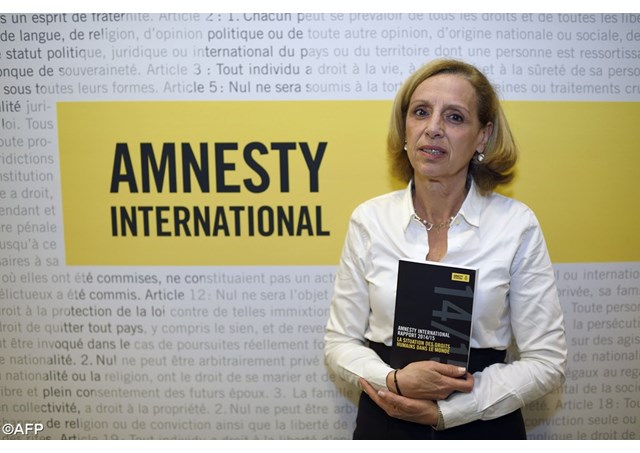
Global Response to atrocities: shameful and ineffective

World leaders must act urgently to confront the changing nature of conflict and protect civilians from horrific violence by states and armed groups, urged Amnesty International as it launched its annual assessment of human rights around the world.
“2014 was a catastrophic year for millions caught up in violence. The global response to conflict and abuses by states and armed groups has been shameful and ineffective. As people suffered an escalation in barbarous attacks and repression, the international community has been found wanting,” said Salil Shetty, Secretary General of Amnesty International.
“The United Nations was established 70 years ago to ensure that we would never again see the horrors witnessed in the Second World War. We are now seeing violence on a mass scale and an enormous refugee crisis caused by that violence. There has been a singular failure to find workable solutions to the most pressing needs of our time.”
Amnesty International’s Annual Report provides a comprehensive overview of human rights in 160 countries during 2014, including regional analysis.
Armed Groups
Of particular concern are the actions of non-state armed groups, including the group which calls itself Islamic State (IS) in the Middle East and North Africa. From beheadings in Syria to a wave of ethnic cleansing and sexual slavery in Iraq, IS has carried out unspeakable crimes that have shocked the world.
“Globally, as the influence of groups such as Boko Haram, IS and Al Shabaab spills over national borders, more civilians will be forced to live under their quasi-state control, subject to abuse, persecution and discrimination,” said Anna Neistat, Senior Director for Research at Amnesty International.
Governments pretending they can’t protect civilians
“Governments must stop pretending the protection of civilians is beyond their power and help roll back the tide of suffering of millions. Leaders must embrace a fundamental change in the way they respond to crises around the world.”
Renounce UN Security Council veto rights in the face of Mass atrocities
The use of vetoes by permanent UNSC members in 2014 against a resolution to refer the situation in Syria to the ICC has effectively enabled a situation which has resulted in the deaths of more than 190,000 civilians, millions of refugees and other gross human rights violations.
Amnesty International is now calling for the five permanent UNSC members to renounce their veto rights in situations of genocide and other mass atrocities.
“This could be a game changer for the international community and the tools it has at its disposal to help protect civilian lives. By renouncing their veto rights the five permanent members of the Security Council would give the UN more scope to take action to protect civilians when lives are at grave risk and send a powerful signal to perpetrators that the world will not sit idly by while mass atrocities take place,” said Salil Shetty.
Adhere to the Arms Trade Treaty
Amnesty International is calling for all states—including the US, China, Canada, India, Israel and Russia – to ratify or accede, and adhere to the Arms Trade Treaty, which came into force last year after decades of campaigning by Amnesty International and others.
“Huge arms shipments were delivered to Iraq, Israel, Russia, South Sudan and Syria in 2014 despite the very high likelihood that these weapons would be used against civilian populations trapped in conflict. When IS took control of large parts of Iraq, it found large arsenals, ripe for the picking. The irresponsible flow of weapons to human rights abusers must stop now,” said Anna Neistat.
Draconian responses
Amnesty International is urging governments to ensure their response to security threats do not undermine fundamental human rights or fuel further violence.
“We are seeing worrying signs that leaders will continue to crack down hard on protests, introduce draconian anti-terror laws and use unjustified mass surveillance techniques in response to security threats. But knee-jerk reactions do not work. Instead they create an environment of repression in which extremism can thrive.”
Refugees and internally displaced people
A tragic consequence of the international community’s inability to deal with the changing face of conflict is one of the worst refugee crises the world has seen, as millions of people – including 4 million from Syria alone – continue to flee violence and persecution.
“It is abhorrent to see how wealthy countries’ efforts to keep people out take precedence over their efforts to keep people alive. The global refugee crisis is only likely to get worse, unless urgent measures are taken,” said Salil Shetty.
“Leaders have it in their power to alleviate the suffering of millions—by committing political and financial resources to assist and protect those fleeing danger, delivering humanitarian aid generously, and resettling the most vulnerable.”
Call to action
“The global outlook on the state of human rights is bleak, but there are solutions. World leaders must take immediate and decisive action to avert an impending global crisis and take us one step closer to a safer world in which rights and freedoms are protected,” said Salil Shetty.
(Amnesty International's press office in London, UK: email: press@amnesty.org)
e-mail: engafrica@vatiradio.va
| All the contents on this site are copyrighted ©. |


